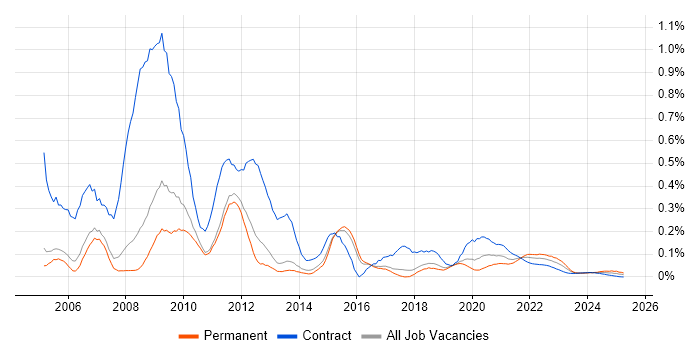Worldwide Web Consortium (W3C)
UK > Work from Home
The table below looks at the prevalence of the term W3C in remote or hybrid work. Included is a benchmarking guide to the salaries offered in vacancies that cited W3C over the 6 months leading up to 11 January 2026, comparing them to the same period in the previous two years.
|
|
6 months to
11 Jan 2026 |
Same period 2025 |
Same period 2024 |
| Rank |
358 |
439 |
487 |
| Rank change year-on-year |
+81 |
+48 |
+159 |
| Permanent jobs citing W3C |
3 |
4 |
1 |
| As % of all permanent jobs with remote/hybrid work options |
0.020% |
0.024% |
0.005% |
| As % of the Miscellaneous category |
0.058% |
0.061% |
0.012% |
| Number of salaries quoted |
1 |
0 |
1 |
| Median annual salary (50th Percentile) |
£49,200 |
- |
£86,000 |
| Median % change year-on-year |
- |
- |
+52.89% |
| UK median annual salary |
£47,000 |
£61,000 |
£62,500 |
| % change year-on-year |
-22.95% |
-2.40% |
- |
W3C falls under the General and Transferable Skills category. For comparison with the information above, the following table provides summary statistics for all permanent job vacancies with remote or hybrid options requiring generic IT skills.
| Permanent vacancies with a requirement for generic IT skills |
5,184 |
6,522 |
8,262 |
| As % of all permanent jobs with a WFH option |
34.57% |
39.53% |
38.08% |
| Number of salaries quoted |
3,309 |
3,608 |
6,516 |
| 10th Percentile |
£28,000 |
£37,500 |
£36,250 |
| 25th Percentile |
£40,000 |
£47,500 |
£47,000 |
| Median annual salary (50th Percentile) |
£58,000 |
£62,500 |
£62,500 |
| Median % change year-on-year |
-7.20% |
- |
-3.85% |
| 75th Percentile |
£80,250 |
£83,750 |
£82,500 |
| 90th Percentile |
£105,000 |
£110,000 |
£100,000 |
| UK median annual salary |
£55,000 |
£60,000 |
£60,000 |
| % change year-on-year |
-8.33% |
- |
-7.69% |
W3C
Job Vacancy Trend for Remote/Hybrid Jobs
Historical trend showing the proportion of permanent IT job postings citing W3C and offering remote or hybrid work options relative to all permanent IT jobs advertised.
W3C
Salary Trend for Remote/Hybrid Jobs
Salary distribution trend for jobs with remote/hybrid work options citing W3C.
W3C
Co-Occurring Skills & Capabilities in Remote/Hybrid Jobs by Category
The following tables expand on the one above by listing co-occurrences grouped by category. They cover the same employment type, locality and period, with up to 20 co-occurrences shown in each category:


